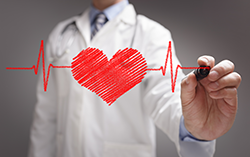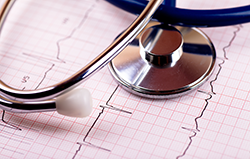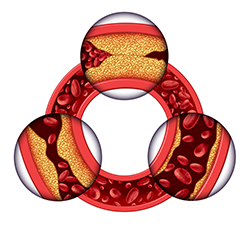Heart disease usually begins after the age of 40 in men, but generally does not begin in women until after menopause. At the age of 60 and thereafter heart disease occurs with equal frequency in both sexes. Initial symptoms are tightness or pain in the chest, shoulder or neck occurring with physical or emotional stress and resolving with rest. Other symptoms, especially in women, include shortness of breath with exertion, abdominal or back pain and nausea.
Risk factors for heart disease include:
1. High blood pressure
2. Diabetes or prediabetes
3. Elevated cholesterol, high LDL (“bad” cholesterol), low HDL (“good” cholesterol), high triglycerides
4. High C reactive protein (an inflammatory marker)
5. Cigarette smoking
6. Obesity (actually a weak factor unless there is morbid obesity- 100 pounds above ideal body weight)
7. Type A personality (the easily stressed, high pressure individual)
8. Family history of heart disease
9. Lack of exercise
10. Orthopedic disability that inhibits exercise
11. Low intake of fruits and vegetables
12. Low intake of alcohol (1-2 drinks per day are actually protective)
13. High homocysteine
14. Presence of autoimmune disease (rheumatoid arthritis)
15. Advancing age
Treadmill stress testing is usually employed to evaluate for the presence of heart disease. Other testing however, may reveal early disease in the absence of either symptoms or an abnormal stress test. The rapid C-T cardiac scan is a non-invasive x-ray study that measures the presence of calcium in coronary arteries. Since calcium should not be present, the calcium score measures how much atherosclerosis has developed. A calcium score of zero indicates extremely low likelihood of disease. A calcium score of 1000 confers a risk of heart attack 5 times higher than a score of 100 or less. Any score above 0, however, indicates a need to evaluate and treat risk factors.
Treatment of Heart Disease
Heart disease is not only preventable, but also reversible by employing lifestyle changes. Exercise produces collateral circulation, lowers resting blood pressure, raises HDL (good) cholesterol and lowers weight. A low glycemic index diet, also low in saturated fat, reduces blood sugar and cholesterol and promotes weight loss. Stress reduction, by changing work routines and stressful relationships, is important.
In conventional medicine, patients with heart disease are routinely treated with statin drugs, aspirin, a beta blocker, and an ACE inhibitor, oftentimes with antidepressants as well. These medications can be reduced or eliminated with other approaches. Statin drugs are the most popular drugs in the world, yet they produce muscle pain and inflammation, and memory impairment. One study also suggests that individuals with lower LDL (bad) cholesterol have a higher incidence of Parkinson’s disease than those with higher LDL.
Some of the supplements we employ in treating heart disease are:
1. Coenzyme Q10
2. L-carnitine
3. Fish oil
4. Magnesium
5. D ribose (a natural sugar that enhances energy production in the heart)- 2 scoops
Chelation therapy has been used in treating heart disease for many years. Although ignored by most conventional physicians, chelation therapy has benefited many individuals by reducing their symptoms and sparing them the need for invasive therapies such as bypass surgery and stents. A controlled study showed that chelation therapy in diabetics reduced cardiac events by half. We employ sodium EDTA, given by intravenous infusion combined with vitamins and minerals.
Another intravenous therapy involves the infusion of phosphatidylcholine, a nutrient fat that comprises the outer membrane lining of every cell in the body. This treatment is often provided along with chelation therapy, on alternate days.
We also offer ECP, external counterpulsation therapy. Inflatable soft cuffs are wrapped around the legs, thighs, and buttocks, and inflated with air during diastole, or relaxation phase of the cardiac cycle. Sixty times a minute blood is forced up the aorta into the heart, increasing blood flow through the coronary arteries and creating collateral circulation. It is a sort of natural cardiac bypass, done without surgery and without risk.
ECP is also effective for treating congestive heart failure, the most common cause of hospital admission in older people. It also treats stroke and peripheral vascular disease, and is in our opinion perhaps the most powerful antiaging therapy available along with ozone.
We have been successful in helping people get off drugs and avoid risky and sometimes ineffective cardiac procedures, and giving them a quality of life unavailable with usual medical approaches.



